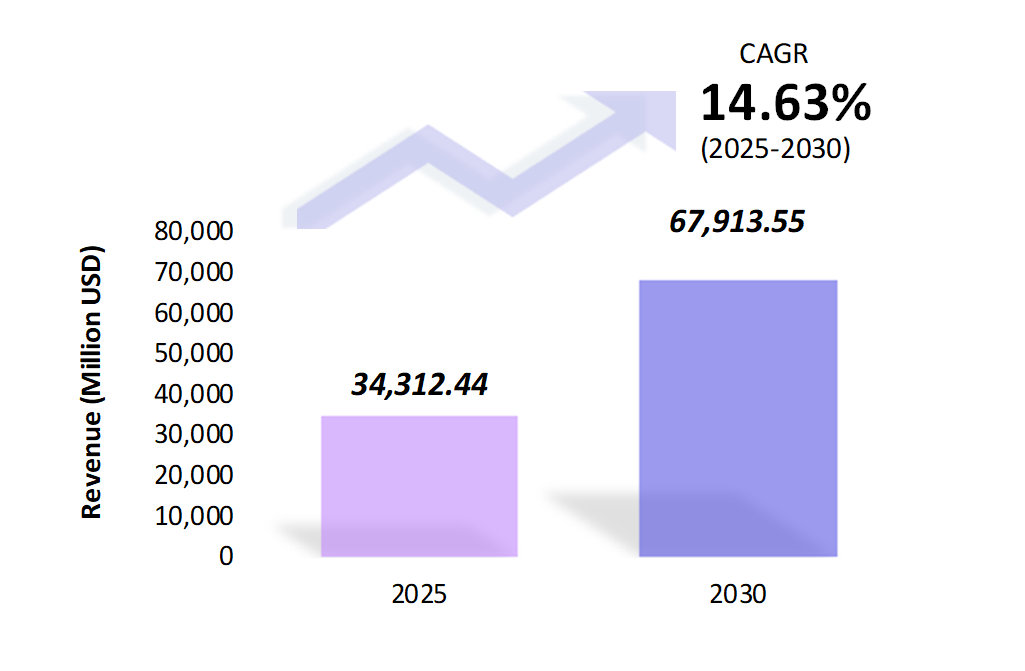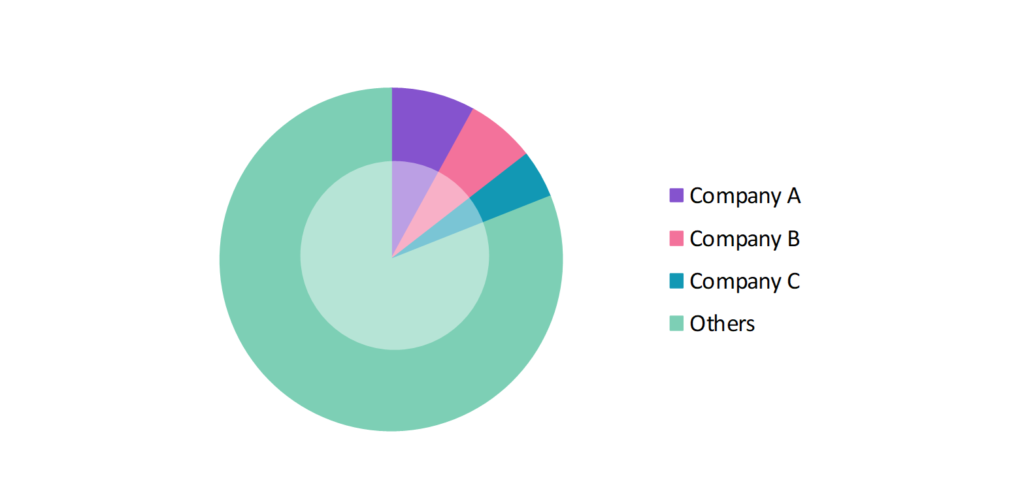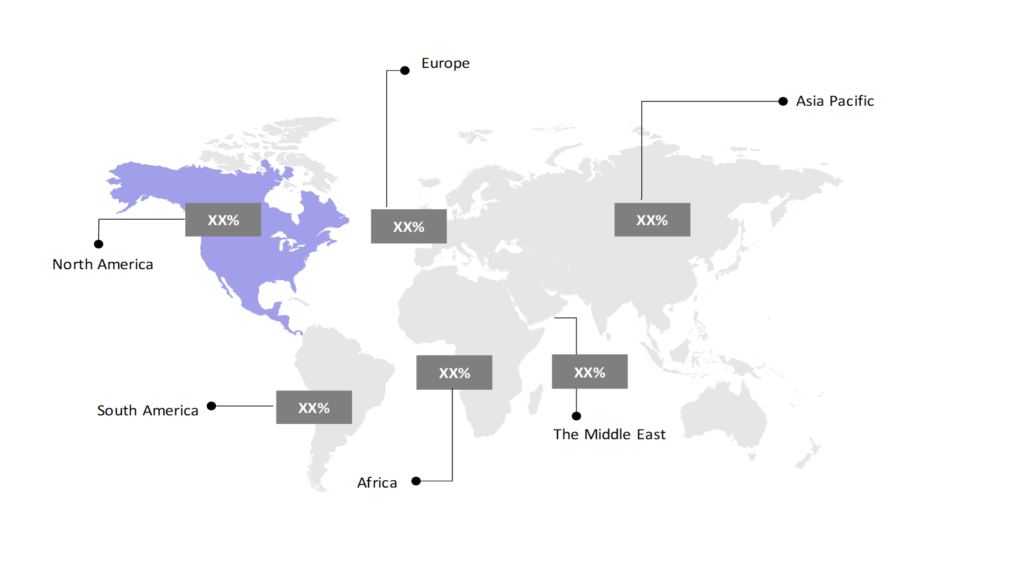Modular Data Center Market: Size, Share, Trends & Forecast (2024-2029)
The market report presents a thorough analysis segmented by Application (Disaster Backup, High Performance/Edge Computing, Data Center Expansion, Starter Data Centers); by End User (IT, Telecom, Banking, Financial Services, and Insurance (BFSI), Defense, Others); by Geography (North America, South America, Asia Pacific, Europe, The Middle East, Africa).
Outlook

- The modular data center market is estimated to be at USD 34,312.44 Mn in 2025 and is anticipated to reach USD 67,913.55 Mn in 2030.
- The modular data center market is registering a CAGR of 14.63% during the forecast period 2025-2030.
- Modular data centers are prefabricated, portable solutions offering scalability, flexibility, and efficiency for data processing and storage needs. Driven by demand for cloud services, edge computing, and HPC, they provide quick deployment, cost-effectiveness, and sustainability benefits.
Request a free sample.
Ecosystem

- The participants in the global modular data center industry dominate the market by offering a wide range of modular data center solutions across various industries.
- These companies primarily focus on product innovation and expansion to cater to growing demand in industries such as telecom, healthcare, etc., along with strategic partnerships and acquisitions to maintain their competitive edge in the market.
- Several important entities in the modular data center market include IBM Corp.; Huawei Digital Power Technologies Co., Ltd.; Dell Inc.; Baselayer Technology, LLC.; HPE Co.; and others.
Ask for customization.
Findings
| Attributes | Values |
|---|---|
| Historical Period | 2019-2023 |
| Base Year | 2024 |
| Forecast Period | 2025-2030 |
| Market Size (2025) | USD 34,312.44 Mn |
| Market Size (2030) | USD 67,913.55 Mn |
| Growth Rate | 14.63% CAGR from 2025 to 2030 |
| Key Segments | Application (Disaster Backup, High Performance/Edge Computing, Data Center Expansion, Starter Data Centers); End User (IT, Telecom, BFSI, Defense, Others); Geography (North America, South America, Asia Pacific, Europe, The Middle East, Africa) |
| Key Vendors | IBM Corp.; Huawei Digital Power Technologies Co., Ltd.; Dell Inc.; Baselayer Technology, LLC.; HPE Co. |
| Key Countries | The US; Canada; Mexico; Brazil; Colombia; China; India; Japan; The UK; Germany; France; Qatar; UAE; Saudi Arabia; Nigeria; Egypt; South Africa |
| Largest Market | North America |
Get a free quote.
Trends
- Adoption of Edge Computing: Modular data centers are gaining traction in edge computing applications, where data processing needs to be close to the source. Edge computing is expanding across industries like telecommunications, manufacturing, and healthcare, which require quick and efficient data processing in real-time, thereby increasing the demand for modular data centers in these sectors.
- Shift Toward Sustainable and Energy-Efficient Data Centers: Sustainability is becoming a key focus area in the data center industry, with modular data centers being seen as a solution for energy efficiency. Companies are deploying renewable energy-powered modules to reduce their carbon footprint, supporting green initiatives and regulatory compliance. In 2022, Schneider Electric introduced an eco-friendly modular data center powered by renewable energy solutions.
- Use of Liquid Cooling: Liquid cooling technology is becoming a popular trend in modular data centers due to its superior ability to manage high-density computing environments. With the increasing need for high-performance computing, traditional air-cooling methods are being replaced by liquid cooling, which enhances energy efficiency and reduces the operational costs of data centers.
Speak to analyst.
Catalysts
- Demand for Data Storage & Cloud Computing: The rapid increase in data generation, fueled by the expansion of big data analytics and cloud computing, is driving the demand for scalable and flexible data center solutions. Modular data centers allow businesses to expand their data processing capabilities quickly and efficiently, meeting the growing demand for data storage. In 2023, Microsoft expanded its modular data center offerings to cater to its cloud computing platform, Azure, which saw a surge in demand for data processing services.
- Cost-effectiveness: Modular data centers are more cost-effective than traditional data centers, as they require lower upfront investment and offer scalability. Companies can start with small modules and add more capacity as needed, reducing capital expenditures and avoiding over-provisioning. This flexibility is particularly attractive to SMEs and enterprises with fluctuating data processing needs.
- Focus on Disaster Recovery: The need for robust disaster recovery solutions is driving the adoption of modular data centers. These portable units can be quickly deployed in disaster-stricken areas or used as backup systems, ensuring business continuity during crises. Modular data centers offer flexibility, mobility, and reliability in managing critical data.
Inquire before buying.
Restraints
- Complexity in Integrating with Existing Infrastructure: One of the challenges of modular data centers is integrating them with existing IT infrastructure, particularly in hybrid cloud environments. Organizations may face technical difficulties in ensuring seamless connectivity between their legacy systems and modular units.
- Challenges in Cooling High-Density Servers: As data centers house increasingly high-density servers, cooling becomes a significant challenge, particularly in modular environments where space is limited. Managing heat efficiently is critical to ensuring performance and reducing energy consumption, and not all modular data centers are equipped with advanced cooling technologies.
- Supply Chain Disruptions: The modular data center market faces challenges due to global supply chain disruptions, particularly in the sourcing of critical components such as cooling systems and power modules. These disruptions can delay the deployment of modular data centers, impacting business operations. In 2022, Schneider Electric experienced delays in delivering modular data centers to customers due to a shortage of key components caused by supply chain bottlenecks.
Personalize this research.
Hotspot

Explore purchase options.
Table of Contents
| 1. Introduction 1.1. Research Methodology 1.2. Scope of the Study 2. Market Overview / Executive Summary 2.1. Global Modular Data Center Market (2019 – 2023) 2.2. Global Modular Data Center Market (2024 – 2030) 3. Market Segmentation 3.1. Global Modular Data Center Market by Application 3.1.1. Disaster Backup 3.1.2. High Performance/Edge Computing 3.1.3. Data Center Expansion 3.1.4. Starter Data Centers 3.2. Global Modular Data Center Market by End User 3.2.1. IT 3.2.2. Telecom 3.2.3. BFSI 3.2.4. Defense 3.2.5. Others 4. Regional Segmentation 4.1. North America 4.1.1. The US 4.1.2. Canada 4.1.3. Mexico 4.2. South America 4.2.1. Brazil 4.2.2. Colombia 4.2.3. Rest of South America 4.3. Asia Pacific 4.3.1. China 4.3.2. India 4.3.3. Japan 4.3.4. Rest of Asia Pacific 4.4. Europe 4.4.1. The UK 4.4.2. Germany 4.4.3. France 4.4.4. Rest of Europe 4.5. The Middle East 4.5.1. UAE 4.5.2. Saudi Arabia 4.5.3. Qatar 4.5.4. Rest of the Middle East 4.6. Africa 4.6.1. Egypt 4.6.2. Nigeria 4.6.3. South Africa 4.6.4. Rest of Africa 5. Value Chain Analysis of the Global Modular Data Center Market 6. Porter Five Forces Analysis 6.1. Threats of New Entrants 6.2. Threats of Substitutes 6.3. Bargaining Power of Buyers 6.4. Bargaining Power of Suppliers 6.5. Competition in the Industry 7. Trends, Drivers and Challenges Analysis 7.1. Market Trends 7.1.1. Market Trend 1 7.1.2. Market Trend 2 7.1.3. Market Trend 3 7.2. Market Drivers 7.2.1. Market Driver 1 7.2.2. Market Driver 2 7.2.3. Market Driver 3 7.3. Market Challenges 7.3.1. Market Challenge 1 7.3.2. Market Challenge 2 7.3.3. Market Challenge 3 8. Opportunities Analysis 8.1. Market Opportunity 1 8.2. Market Opportunity 2 8.3. Market Opportunity 3 9. Competitive Landscape 9.1. IBM Corp. 9.2. Huawei Digital Power Technologies Co., Ltd. 9.3. Dell Inc. 9.4. Baselayer Technology, LLC. 9.5. HPE Co. 9.6. Company 6 9.7. Company 7 9.8. Company 8 9.9. Company 9 9.10. Company 10 |
Know the research methodology.
Modular Data Center Market – FAQs
1. What is the current size of the modular data center market?
Ans. In 2025, the modular data center market size is USD 34,312.44 Mn.
2. Who are the major vendors in the modular data center market?
Ans. The major vendors in the modular data center market are IBM Corp.; Huawei Digital Power Technologies Co., Ltd.; Dell Inc.; Baselayer Technology, LLC.; HPE Co.
3. Which segments are covered under the modular data center market segments analysis?
Ans. The modular data center market report offers in-depth insights into Application, End User, and Geography.
